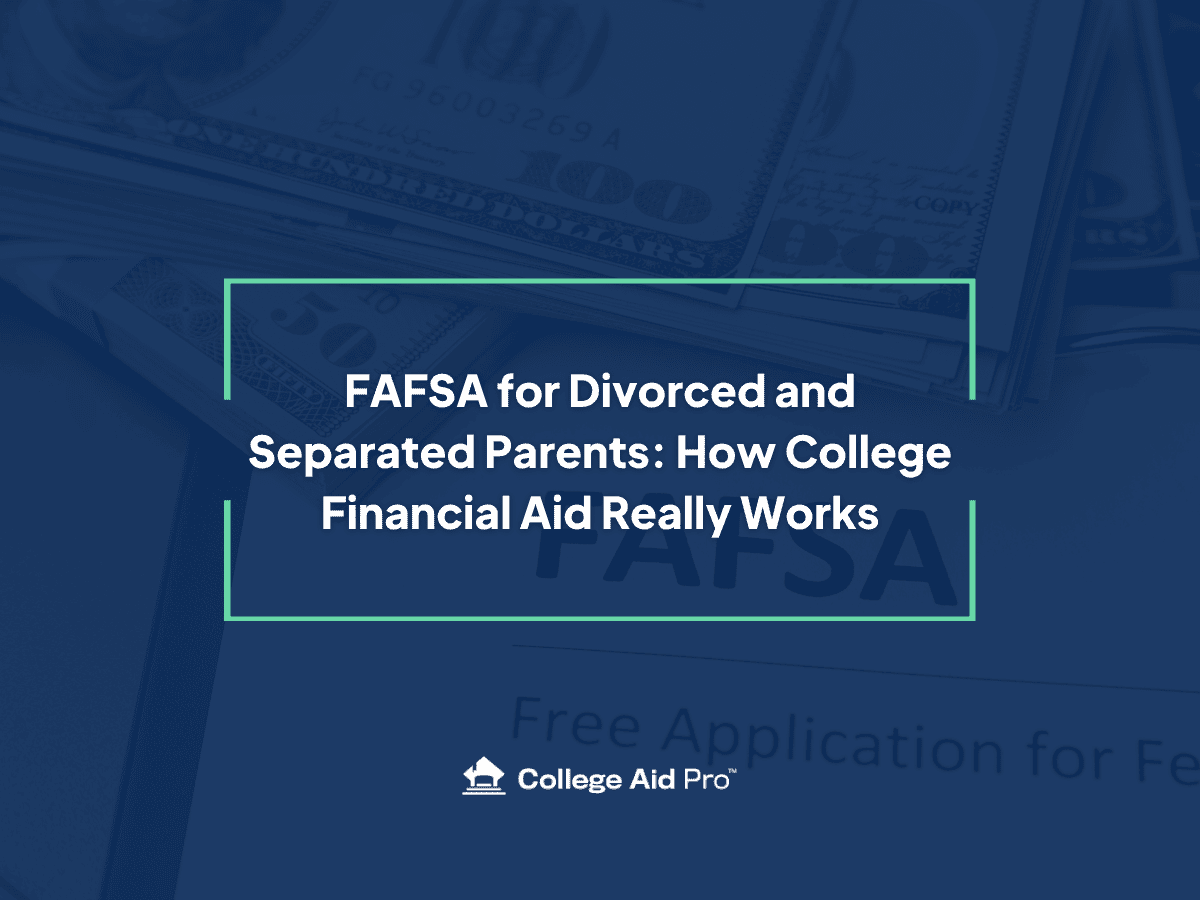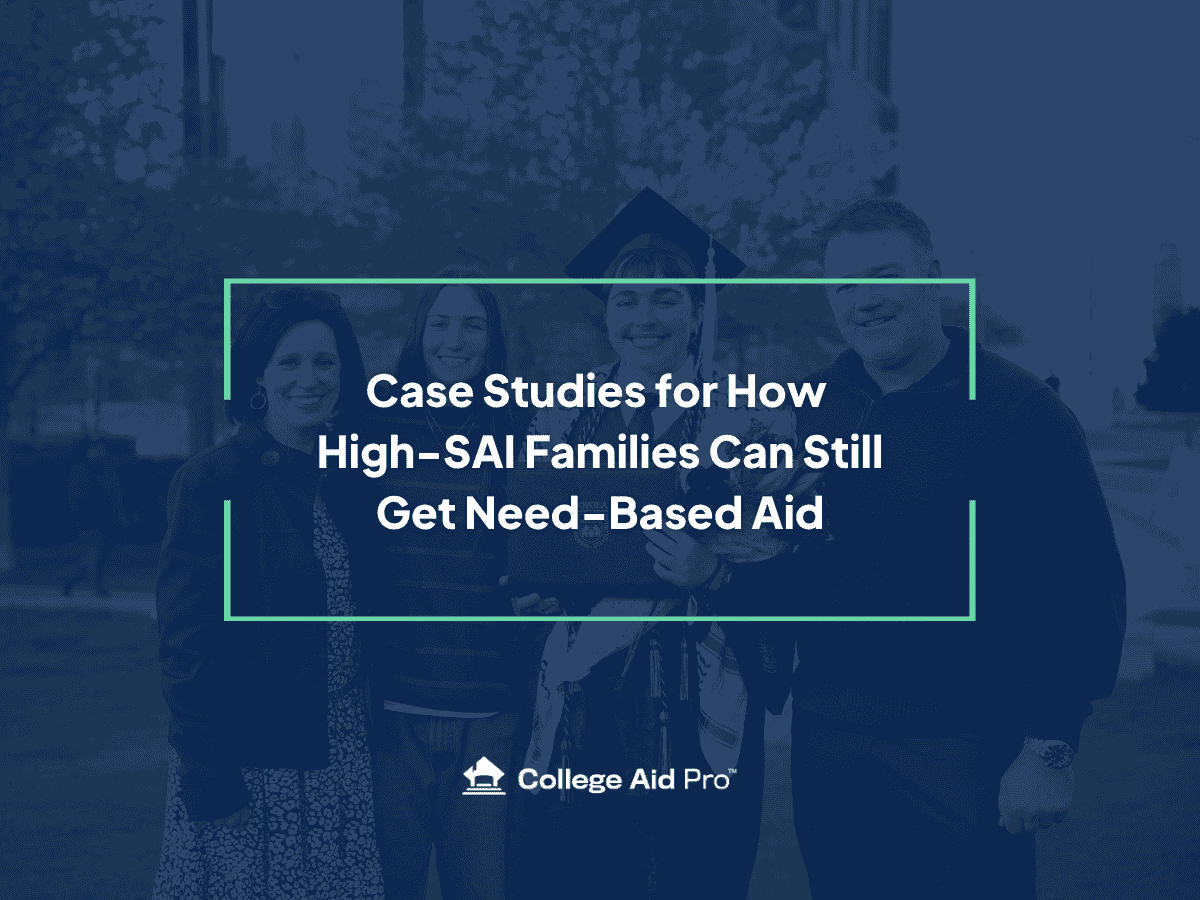FAFSA for Divorced and Separated Parents: How College Financial Aid Really Works
When college planning meets a complicated family situation, the financial aid process can feel like a maze. If you’re divorced, separated, remarried, or co-parenting, you’ve probably wondered:
- Which parent should fill out the FAFSA?
- Does remarriage change financial aid?
- What happens if my ex won’t cooperate—or has disappeared?
- How do colleges know what’s “true”?
In this episode of The Ol’ College Try podcast, hosts Matt Carpenter and Peg Keough tackle one of the most confusing—and important—topics for families: how colleges handle financial aid for divorced and separated parents.
🎓 Understanding How Colleges Define “Separated” or “Divorced”
The first thing to know? The financial aid world has its own definitions.
According to Matt and Peg, a family is considered separated when the parents live in two separate households—not just in different parts of the same house.
You don’t need a formal legal separation or finalized divorce decree. If you’re truly living apart and supporting your child separately, colleges will treat you as two households for financial aid purposes.
That’s good news for families who haven’t finished the legal process but are already living apart.
💡 Key takeaway: Two separate households = considered “separated” for financial aid. Legal paperwork isn’t required.
📝 Who Files the FAFSA?
Here’s where most parents get tripped up.
For the FAFSA (Free Application for Federal Student Aid), only one parent reports their income and assets. That parent is called the custodial parent, but that term can be misleading.
It doesn’t mean the parent with primary physical custody.
It means the parent who provides the most financial support for the student in the year before the FAFSA is filed.
So, if both parents split expenses 50/50, the rules say:
- The parent who earns more money is the custodial parent.
- But if one parent provides even slightly more support—say, one dollar more—they can (legally) be considered the custodial parent.
✅ Pro tip: It’s worth planning ahead. Small adjustments in who pays for what can have a major impact on financial aid eligibility.
💰 What Doesn’t Matter on the FAFSA
Matt and Peg emphasize that certain things don’t affect which parent fills out the FAFSA:
- Who claims the student on taxes
- Where the student lives most of the time
- Parenting plan or custody agreement language
These factors are irrelevant. The FAFSA only looks at who provides the most financial support.
🔄 What If You Were Married in the “Base Year”?
Another common question: what if you were married during the tax year used on the FAFSA (the “prior-prior year”) but are now divorced or separated?
For example: You’re filling out the FAFSA in 2025 for a student starting college that fall. The FAFSA uses 2023 tax returns—but you were still married then.
Here’s the right approach:
- The custodial parent still fills out the FAFSA alone.
- They manually separate their income and assets from the joint tax return.
- Even though the IRS Data Retrieval Tool might import joint income, you can override it with the custodial parent’s actual income and asset information.
This might trigger a verification request from colleges, since your FAFSA won’t match your tax return. That’s normal. Be ready to explain and provide supporting documents like W-2s or a tax transcript.
💍 When a Parent Remarries
Remarriage can be a financial aid game-changer.
If the custodial parent remarries, the new spouse’s income and assets must be included on the FAFSA—no exceptions.
Prenups don’t matter. Whether the stepparent contributes to the student’s expenses or not doesn’t matter. The FAFSA formula treats that household as one financial unit.
⚠️ Tip for planning: If one biological parent remarries and the other doesn’t, sometimes it makes more sense for the unmarried parent to be the custodial one—if that parent provides a bit more financial support.
🏛️ FAFSA vs. CSS Profile: Two Different Worlds
Families applying to CSS Profile schools (typically private colleges) face another layer of complexity.
Unlike the FAFSA, most CSS Profile schools require financial information from both biological parents—even if they’re divorced or separated.
That means:
- The custodial parent submits the main CSS Profile.
- The non-custodial parent fills out a separate “non-custodial” Profile.
Each form goes to the College Board, and colleges use both to calculate aid.
However, some CSS schools—like Vanderbilt, University of Chicago, and Santa Clara University—don’t require the non-custodial parent’s info. College Aid Pro’s software tracks these distinctions so families know which schools do and don’t require both parents.
🙅 What If the Other Parent Won’t Cooperate?
If your ex refuses to provide information—or you can’t locate them—colleges do have a process for that. It’s called the Non-Custodial Waiver.
This form lets students and parents explain why the other biological parent can’t (or shouldn’t) be included.
In serious situations (estrangement, incarceration, safety concerns), schools will usually grant the waiver.
But simply saying “my ex won’t do it” isn’t enough.
Colleges typically require:
- A written statement from the parent and student
- Documentation or a third-party letter from a counselor, therapist, clergy member, or another professional confirming the situation
Once approved, the college will process your aid as if the non-custodial parent doesn’t exist—similar to a FAFSA-only school.
🔁 Can Custodial Status Change Year to Year?
Yes.
Each year, colleges reassess based on current reality. If financial support shifts between parents—say, one parent begins paying more bills—you can update who’s listed as the custodial parent on the next FAFSA.
Families often make adjustments after understanding the rules. As Peg says, “Life changes, and so can your aid strategy.”
🔍 How Do Colleges Verify This?
Surprisingly, they usually don’t.
Colleges have limited ways to verify living arrangements or support details. Unless something raises a red flag—like a $30,000-income parent claiming to support a student entirely while the other earns $500,000—they typically trust what families report.
So yes, it’s mostly the honor system. But honesty is still the best policy: misreporting can lead to major consequences if discovered later.
🎧 Final Thoughts from Matt & Peg

College financial aid is confusing enough without a complex family dynamic.
But understanding these rules can help you legally and strategically maximize your aid—especially if you plan early.
“Don’t get divorced just for financial aid,” Matt jokes. “But if you are divorced or separated, you can absolutely plan smartly.”
💬 Want help figuring out your family’s best path?
Schedule a Free Consultation with one of our College Planning Experts to see how your specific family structure impacts college costs and aid eligibility.



